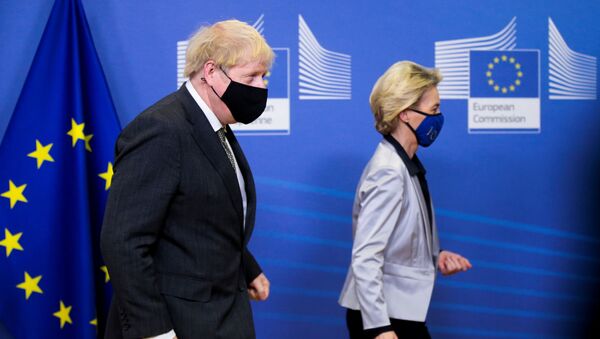UK Prime Minister Boris Johnson and EU Commission President Ursula von der Leyen announced on 24 December that the year-long trade deal talks between London and Brussels had concluded successfully. In his address, Johnson praised the UK taking "back control of our laws and our destiny", while Ursula von der Leyen focused on the fact that the agreement was "fair, balanced and right" and expressed hope that it was a solid foundation for "a new start".
Despite the publicly positive review of the trade agreement, which Johnson described as a "comprehensive Canada-style" deal, the real implications of it for both the UK and the European bloc might not be a "win-win" as the parties to the talks described it, according to Terrence Guay, professor of international business at the Smeal College of Business at Pennsylvania State University. He suggests that it might be nothing more than a façade to compel both the UK and the EU parliaments to ratify the deal, which will otherwise be void.
The deal is done. pic.twitter.com/zzhvxOSeWz
— Boris Johnson (@BorisJohnson) December 24, 2020
A deal is better than the "no deal" option both sides were considering during the negotiations, but it may be possible that one of the sides, namely the UK, made more concessions than the other to make that deal happen, Guay notes.
Still, it is hard to say who won more in the deal before its full text is available for analysis, and it is something that Guay, and his colleague, Robert Oulds, director of the Bruges Group independent think tank, agree on. Oulds stresses that "the devil is in detail" and that the Brexit trade deal might not bring the UK what it had long sought for – sovereignty from Brussels.
"Perhaps there are some positive elements but at this point in time it is too early to tell. All we have, so far, without a proper analysis, is of course the Prime Minister’s statement […] no doubt there would be aspects that will be very reassuring for many people and will certainly keep trade open. [However,] there are prices that are paid in this deal and that essentially is that Northern Ireland is really remaining within the EU and will be following the same rules that other EU states follow", Oulds says.
Northern Ireland's status as part of the trade deal leaves the question about the "territorial integrity of the UK" unresolved, which will thus be undermined, the director of the Bruges Group indicates. But at the same time, he sees the trade deal as a victory for London in any case, as it frees the UK from all EU-related liabilities.
Oulds stresses that London paid a lot for the bailouts of other EU members and predicts that another "crash" might be upon the bloc in the near future. However, this time UK taxpayers will not be paying for the EU's "bail-out schemes", he adds.
Did UK Win or Concede on Issues That Hampered Trade Deal Talks?
The outcome of the trade deal negotiations seemingly indicates that the UK made more concessions than the EU on the matters that hampered the talks for most of the year, Professor Terrence Guay says. He indicates that despite being free to regulate its domestic market as it pleases, London will still not be able to stray far away from the EU's regulations in order to uphold a level playing field, because otherwise Brussels will be free to impose tariffs on British goods. He also stresses that the EU's right to keep 1/3 of the fish caught in British waters for the next five years is a far-cry from what Boris Johnson had sought in the talks.
The EU could previously keep as much as half of the fish caught in the UK's EEZ, but the British prime minister still expressed contempt for the deal struck on fisheries with Brussels, to the point of wearing a fish-themed tie during his address to the nation.
The contrast between the press conferences was so depressing. Von der Leyen and Barnier all statesmanlike and sorry it had come to this. Johnson, well, just Johnson. The polar opposite. Wearing a fish tie and making jokes about sprouts.
— Ned Go Grey (@gazza647) December 24, 2020
While Guay suggests that Johnson was under a lot of pressure to conclude the year with successful Brexit trade deal talks and was therefore "desperate" to strike an agreement, his colleague, Robert Oulds, believes the UK prime minister simply really strived to avoid a "no deal" scenario.
"I'm not sure Boris Johnson fought particularly hard against the European Union. He was actually sort of working very much with them and trying to curry favour with Brussels and other European Union leaders […] he really did show that he was the one who wanted a deal, would be willing to adapt to - in some way at least - to what the European Union wanted", Oulds said.
The resulting compromises, which seemingly gave the EU what it wanted, was a direct result of Johnson sincerely seeking to reach a deal with the bloc, the think tank director sums up, adding that the final judgement in regards to the trade agreement should be made once all of its details have been revealed to the public.




